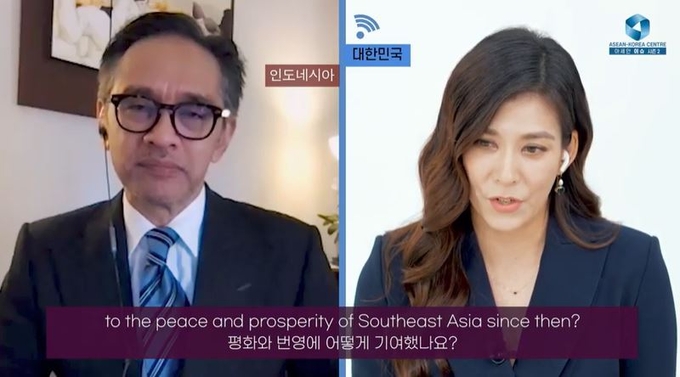
‘아세안은 중요한가?’ 한국에게 아니면 중국과 미국과 EU에게? 이 질문을 던진 이 중에 가장 주목을 받은 사람 중 하나가 마티 나탈레가와 전 인도네시아 외교장관이다.
그는 같은 이름의 책도 발간했다. 그는 “1967년 이전에는 아세안 지역에 심각한 긴장감이 존재했다. 당시만 해도 아세안 지역의 많은 국가들이 여전히 식민지 시대의 영향과 당시 미국과 소련간의 초강대국 간 경쟁의 그늘에 가려져 있었다”고 진단했다.
올해 8월 8일은 동남아국가연합(ASEAN)의 창립 54주년이 되는 날이다. 벌써 반백년을 훌쩍 넘었다. 또한 지난해 아세안 공동체는 출범 5주년을 맞이했다.
한-아세안센터는 한국과 아세안 간 교역 증대, 투자 촉진, 문화·관광 협력 확대 및 인적 교류 활성화를 목적으로 2009년 3월 서울에 설립된 정부 간 국제기구다. 회원국은 한국과 아세안 10개국(브루나이, 캄보디아, 인도네시아, 라오스, 말레이시아, 미얀마, 필리핀, 태국, 싱가포르, 베트남)이다.
한-아세안센터 ‘아세안 이슈’ 제2화는 마티 나탈레가와 전 인도네시아 외교장관이다. 코로나19 팬데믹 상황에서 7월 9일 진행된 줌을 통한 영상 인터뷰에서 제니퍼(Jennifer)가 그에게 오래된 질문을 다시 물었다. 지금도 “아세안은 중요한가?”
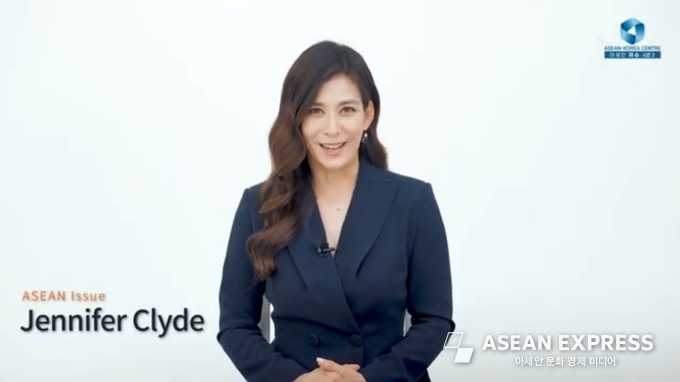
제니퍼는 아리랑 국제방송 대표 토크쇼 프로그램의 호스트다. 역시 마티 나텔레가와 장관은 내공이 깊었다. 그가 웅숭깊게 진단한 오늘날 지역적, 세계적 맥락에서 아세안 그리고 한-아세안 관계의 중요성과 관련성은 경청할 만한 인사이트를 보여주었다.
■ 올해 8월 8일은 창립 54주년, 1967년 아세안 역사적 합의로 출발
제니퍼(Jennifer, 이하 J): 올해 8월 8일은 동남아국가연합(ASEAN)의 창립 54주년이 되는 날이다. 또한 지난해 아세안 공동체는 출범 5주년을 맞이했다. 장관님이 쓰신 책에 보면, 1967년 이전에는 아세안 지역에 심각한 긴장감이 존재했고, 당시만 해도 아세안 지역의 많은 국가들이 여전히 식민지 시대의 영향과 당시 미국과 소련간의 초강대국 간 경쟁의 그늘에 가려져 있었다고 말했다.
그럼에도 불구하고 아세안의 창립 회원국인 인도네시아, 말레이시아, 필리핀, 싱가포르, 그리고 태국 5개국은 당시 아세안 지역에 만연해 있던 ‘신뢰부족’을 ‘전략적 신뢰’로 전환하기 위한 역사적인 합의를 이루었다.
당시 무엇이 그러한 기념비적 결정을 가능하게 했는지 알고 싶다. 아세안이 창설된 후 동남아지역의 평화와 번영에 어떻게 기여했나요?
마티 나탈레가와(Marty Natalegawa, 이하 M): 무엇보다도 그런 변화가 하룻밤 사이에 일어난 게 아니라는 것을 인식하는 것이 중요하다고 생각한다. 그런 변화는 단순히 선언문이나 협정을 체결한다고 일어나는 것이 아니다. 이는 사고방식의 변화와 관점 및 패러다임의 변화를 필요로 한다. 하나의 과정이고 그 속에는 우여곡절도 많았다.
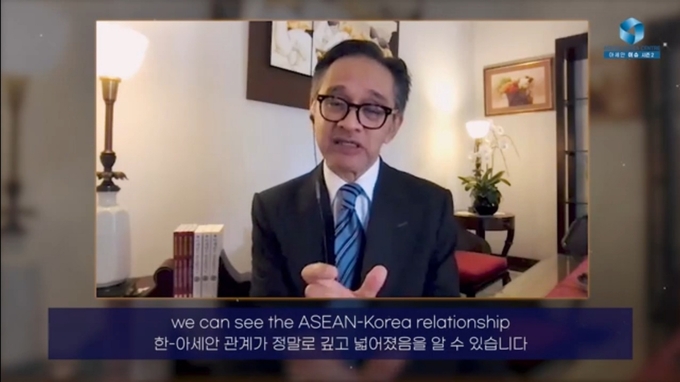
.
꾸준하게 진전이 있었다고 볼 수는 없지만, 무엇보다 당시와 그 이후 동남아 국가들의 지도자들은 번영과 안보와 같은 역내 문제들이 본질적으로는 공동의 문제라는 것을 이해하고 있었다고 생각한다.
다른 국가를 희생시키면서 이익을 추구할 수 없는 거죠. 그리고 일단 역내 어떤 한 국가의 안보도 공동체로서 함께 향유되어야 한다는 것을 인정하게 되면 그 다음부터는 어떤 조치를 취해야 할지가 명확해진다.
동남아 국가들 사이에서도 영토 문제나 국경 문제처럼 (오랫동안) 내재된 문제와 도전과제들이 많이 있다. 역내 국가간 관계에 부담을 주는 역사 문제도 있고, 강대국과의 관계가 반드시 일치하지 않는 측면도 있다.
우리가 통합하지 못했을 이유는 수없이 많지만, 적절한 정치적 의지와 변혁적인 사고방식이 있었기에 한 단계씩 전진하면서 많은 것들을 변화시켜 왔다.
■ “아세안 중심성을 유지하는데 가장 핵심 과제는 결국 역내 여러 도전과제 해결의지”
J: 수년 동안 아세안 국가들은 “중심성(centrality)”의 개념을 강조해 왔다. 역내 문제를 다루는 데 있어서 주도적인 위치에 있어야 한다는 것이죠. 아세안+1, 아세안+3, 동아시아정상회의, 아세안지역안보포럼(ARF) 등아세안이 주도하는 수많은 지역 메커니즘은 모두 역내 문제에 대한 아세안의 중심성을 강화해 왔다.
장관께서는 책에서 이러한 “중심성”은 당연하게 받아들여져서는 안 되며, 특히 역내 역학 변화와 증가하는 불확실성을 감안할 때 오늘날 아세안은 지역 협의체에서 중심성과 리더십을 적극적으로 “확보”해야 한다고 강조했다.
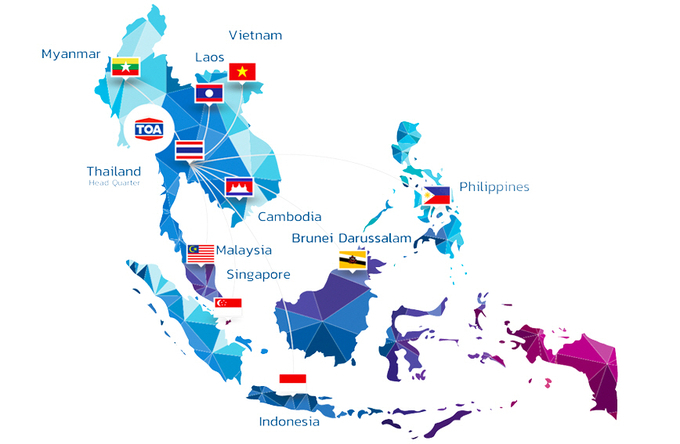
아세안의 중심성을 유지하는데 있어 가장 핵심 과제는 무엇이라고 생각하십니까? 또한 아세안 회원국들이 이러한 도전에 어떻게 공동으로 대처해야 할까요?
M: 동북아시아와 마찬가지로 동남아시아는 냉전시대 계속되는 강대국간 이익과 경쟁에 의해
역사적으로 나뉘어진 지역이다. 오늘날 새로운 역학 관계들이 있는데요, 가령 미-중 갈등뿐 아니라 인도와 중국 등 다른 국가간 역학 관계도 있다.
따라서 동남아시아 국가들에게 강대국간 관계 사이에서 입장을 정하고 그 관계를 관리해 나가는 것은 영원한 도전이었다. 소위 강대국 사이를 왔다 갔다 하는 매우 복잡한 상황에서 끊임없이 대응하고 대처하는 현실인 거죠. 그리고, 여러 해를 거듭하면서 아세안이 역내 발전에서 주도적 역할을 한다는 “아세안 중심성” 개념은 인정을 받아왔다.
아세안 중심성을 유지하는데 가장 핵심 과제는 결국 현재 역내 여러 도전과제에 대해 아세안이 얼마나 적실성 있게 대응하느냐 그리고 역외 파트너 국가들에게 얼마만큼의 편안함과 신뢰를 줄 수 있느냐가 아닐까 생각한다.
오늘날 미국, 중국, 한국, 일본과 같은 나라들이 아세안 회의에 참여하거나 아세안과 협력하는 이유는 국제 문제에 대한 아세안의 객관성과 공동의 선을 추구하는 아세안의 역량에 대한 확신 있기 때문이다. 그런데 지금은 이게 말처럼 쉽지만은 않은 상황이다.
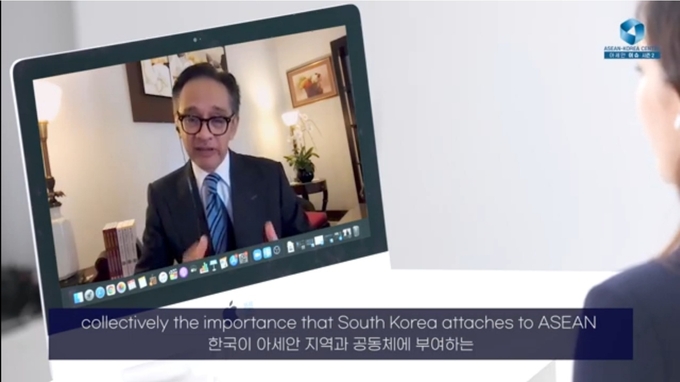
현재 우리 지역에는 미국과 중국, 미국과 러시아 그리고 인도와 중국 등 경쟁 구도가 많다. 이 가운데 일본, 호주, 인도와 같은 나라들이 참여하는 쿼드(QUAD)도 부상하고 있다. 지정학은 끊임없이 변화하고 있다. 변화는 영구적이기 때문에 아세안이 적실성 그리고 역내에서 중요성을 유지하려면 변화에 적응하는 능력을 가져야 한다.
■ “미얀마 사태로 아세안의 시험대...미얀마 젊은 세대 좌절감 살펴봐야”
J:오늘날 아세안은 코로나19에서부터 남중국해 문제, 심화되는 경제 불평등 그리고 기후변화에 이르기까지 다수의 도전에 직면해 있다. 이러한 과제들 중 가장 시급한 위기 중 하나는 폭력사태가 심각해지고 있는 미얀마 사태라고 할 수 있는데요. 장관님께서는 아세안이 미얀마 위기를 평화적으로 해결하기 위해 어떤 조치를 더 취할 수 있다고 보십니까?
M: 아세안이 중심성을 유지하려면 남중국해와 같은 지정학적 문제도 헤쳐나가야 하지만
방금 언급된 21세기 문제들 국가안보를 넘어 인간안보를 위협하는 문제들에 대해서도 역할을 해야 한다. 유행병과 같은 펜데믹 상황에서는 국가안보뿐만 아니라 개인의 건강 등 개개인의 안보가 중요하게 되며, 이러한 상황에서 아세안은 한국과 같은 파트너 국가들과 함께 해결책을 제시해야 한다.
미얀마와 관련해서는 이번 사태는 확실히 아세안에게 있어 시험대가 되고 있다. 그렇지만, 아세안은 과거부터 미얀마 문제에 관여해 왔기에, 지난 10년간 미얀마의 민주개혁을 위해 미얀마를 독려하고 촉구하고 장려해왔기 때문에 아예 처음부터 다시 노력해야 하는 문제는 아니다.
한국이나 인도네시아와 같이 권위주의 통치에서 민주국가로 변혁을 겪어 온 국가들은 이러한 변화가 하나의 과정임을 인식하고 있다. 그리고 그 과정은 지속적인 노력과 보살핌, 용기 그리고 인내와 회복력이 필요하다. 현재 미얀마는 역사적 시험대라 할 수 있을 정도로 매우 어려운 도전에 직면해 있다.
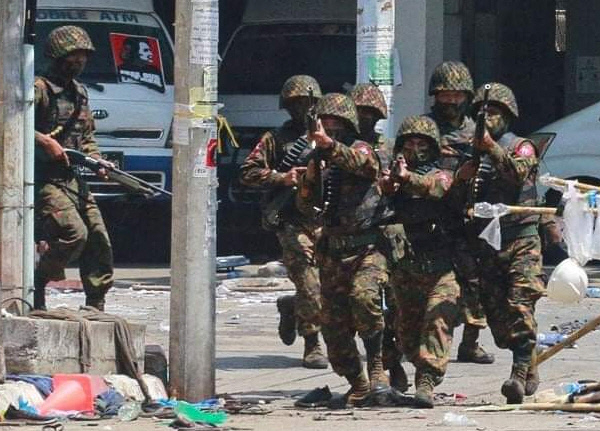
그리고 아세안은 이 문제 해결책의 한 부분이 되어야 한다. 미얀마 사태 초기에는 ‘내정 불간섭’ 원칙 때문에 아세안 국가들이 관여할 수 없는 문제인지에 대한 논란이 있었으나 다행히도 이제는 어느정도 합의가 이뤄진 것 같다.
아세안은 미얀마 문제에 대해 정상회담을 개최했으며, 이를 통해 미얀마에 대한 이른바 ‘5개 합의안’을 발표했다. 그러므로 적어도 이제 미얀마 사태에 대한 아세안의 개입 여부에 대한 문제는 이미 다뤄졌다 할 수 있다. 앞으로가 더 중요한데요, 아세안이 어떻게 미얀마 사태 해결에 도움을 줄지에 대한 부분이다.
이는 매우 어려운 과제가 될 것으로 예상되는데 왜냐하면 5대 합의안이 발표되자마자 미얀마 군부가 이에 대한 자체적인 자의적 해석을 내놓았기 때문이다. 이러한 행동은 아세안에게 큰 도전이 아닐 수 없다.
제 생각에는 아세안이 인내심으로 가지고 5대 합의사항에 대한 후속조치를 지속적으로 추진해야 한다. 구체적으로 폭력 중단, 대화 촉진, 특사 임명, 인도적 지원과 관련 조치들이다.
한편, 아세안의 대응에 대해 특히 미얀마 젊은 세대들 사이에서는 엄청 좌절감이 감돌고 있다. 이번 미얀마 사태는 아세안에게 있어 하나의 시험대일 뿐만 아니라 현재의 아세안 지도부에게 미얀마 문제와 관련하여 경종을 울리는 계기가 되고 있다.
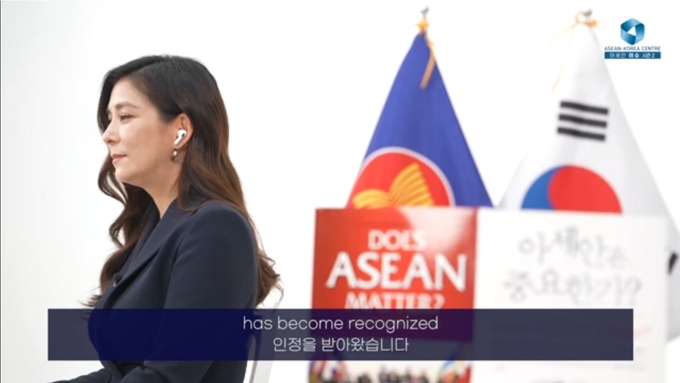
■ “한국과 아세안은 서로에게 중요하다. 아시아 금융위기때 한국 도움 잊지 않았다”
J: 한국과 아세안은 서로에게 중요하다고 생각하십니까?
M: 한-아세안 관계에 대해 생각했을 때 아무리 찾아보려고 해도 부정적인 부분은 찾을 수 없었습니다. 굳이 찾는 다면 관계를 더 향상시키고 아직 달성하지 못한 잠재력을 충족시키는 도전들이 남았다고 할 수 있겠죠. 관련 수치들을 보면 (한-아세안 관계에서) 경제적 영역이 얼마나 중요한지 금방 알 수 있다.
경제 공동체로서 아세안의 중요성은 앞으로 수십년 동안 더욱 커질 것이다. 일부 분석가들은 2050년이 되면 아세안은 세계에서 네 번째 혹은 다섯 번째로 큰 경제가 될 것이라고 말한다. 따라서 한국과 아세안이 공동 번영을 향한 여정에 함께 긴밀히 협력하지 않는다면 이는 기회를 놓치는 것이라고 생각한다.
하지만 이것은 절대 일방적인 관계가 아니다. 한국뿐만 아니라 아세안 국가들도 한국의 경제 성장과 잠재력으로부터 엄청난 이익을 얻고 있다. 개별 아세안 회원국을 살펴보면 아세안 회원국 모두 한국과의 경제적 협력으로 혜택을 받아 왔음을 알 수 있다.
1998년 경제 위기, 이른바 아시아 금융위기가 발생했을 때 인도네시아를 포함한 많은 역내 국가들의 경제가 붕괴됐던 것을 기억한다. 당시 많은 외국 기업과 외국인들이 인도네시아를 떠났다. 유일하게 한국 기업들과 한인 공동체만이 인도네시아에 남아있었다.
한국 기업이나 한국인들은 남아 있을 뿐만 아니라 실제로 (인도네시아와의) 관계를 더 돈독히 하려고 노력했다. 인도네시아 국민들은 그때를 결코 잊지 않고 있다. 도움이 필요한 순간에 인도네시아 한인 사회는 우리를 버리지 않았다. 그들은 한국과 인도네시아 사이의 더 깊은 유대감을 형성했고 이를 통해 한국은 우리에게 믿음직한 친구임을 보여줬다.
■ “신남방정책 이행을 통해 한-아세안 정말로 깊고 넓어졌다. 지속적으로 이어졌으면”
J: 장관님께서는 전직 정부 관료이자 아세안의 지식인 공동체를 대표하는 오피니언 리더로서
신남방정책을 어떻게 평가하십니까? 아세안의 관점에 볼 때 신남방정책의 주요 성과와 한계는 무엇이라고 생각합니까?
문재인 대통령은 2017년 11월 아세안 순방중, 아세안과의 협력관계를 획기적으로 발전시켜나간다는 ‘신남방정책’을 발표, 한국과 아세안간 ‘사람 중심의 평화와 번영의 공동체’를 만들어 가자는 비전 제시했다.
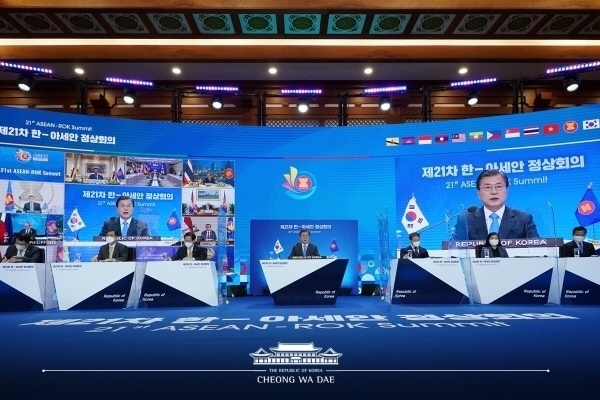
M: 무엇보다도 신남방정책의 중요성은 한국이 아세안 지역과 공동체에 부여하는 중요성을 아세안에게 알리는 데 있다. 아세안에게 정치적 표명은 다른 어떠한 표현보다 매우 중요하다고 할 수 있다. 아세안과 매우 중요한 관계를 맺고 있는 국가가 이 지역의 중요성을 인정하는 대외정책을 공식적으로 그리고 공개적으로 채택한 것인데, 이러한 발표의 중요성은 아무리 강조해도 지나치지 않다.
신남방정책 이행을 통해 우리는 한-아세안 관계가 정말로 깊고 넓어졌음을 알 수 있다. 한-아세안 간의 협력 분야가 더욱 다변화했을 뿐만 아니라 특히 기술 분야와 민간교류 협력이 더욱 깊어지는 것을 보았다.
특히 한-아세안센터는 한국 내에서 아세안에 대한 보다 나은 인식을 심어주는 데 매우 중요한 역할을 하고 있다. 이런 면에서 신남방정책의 추진과 이행과정에서 한계나 문제점이 보이지는 않다. 다만, 이러한 대외정책이 계속되고 더욱 발전할 수 있기를 바란다.
(대외정책의 추진) 또한 하나의 과정이기 때문에 여러 해에 걸쳐 지속적인 노력과 투자가 필요합니다. 최근 수년간 만들어진 모멘텀이 어쩌다 소멸된다면 유감일 것이다. 저는 한국과 아세안 양쪽 모두 더욱 긴밀한 교류와 협력에 대한 의지가 지속되기를 바란다.
■ “미-중 갈등, 계란을 모두 한 바구니에 담지 않듯이 다각화해야...균형보다 평형을”
J: 점증하는 미-중 경쟁과 세계 경제의 불확실성은 아세안 회원국들과 한국을 포함한 이 지역의 많은 중소 국가들의 전략적 결정에 압박을 가하고 있다. 그렇다면, 아세안 회원국과 한국이 외부 충격에 대한 회복력을 강화하고 지역의 평화와 안정을 유지하기 위해 협력할 수 있는 방법은 무엇이라고 생각하십니까?
M: 미-소 냉전 때와는 달리, 현재 미-중 역학 관계의 주요 특징 중 하나는 경쟁 구도와 역학 관계가 보다 다면적이라는 것이다. 정치안보 및 전통적 안보 영역뿐만 아니라 경제적 관계, 무역, 금융 및 기술 영역에도 광범위하게 영향을 주고 있다.
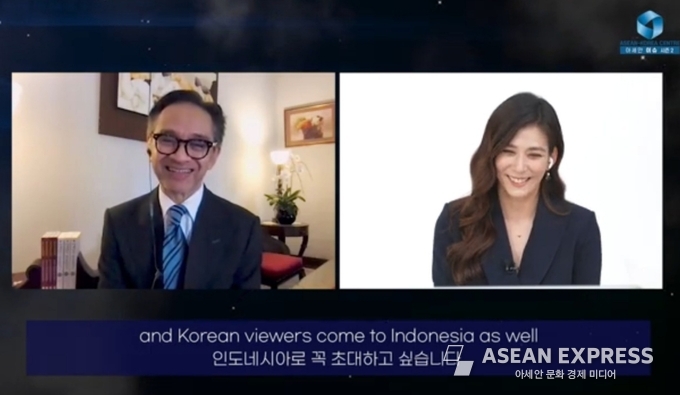
따라서, 한국과 아세안 같은 나라들이 이러한 현실을 어떻게 다루고 관리해야 하는지를 생각해보면 이는 정치안보 영역에만 국한된 것이 아닙니다. 매일 매일의 일상에서도 이러한 현실에 직면하게 되죠. 예를 들어 미국과 중국간의 경제 디커플링은 기술, 무역, 금융 등 분야에서도 새로운 분열을 야기한다.
이러한 가운데 한국과 아세안과 같은 나라들은 둘 중 하나를 선택해야 하는 상황에 놓이거나
적어도 그에 따른 피해를 줄이기 위해 노력해야 하는 상황에 처할 수 있게 된다.
한 가지 해결책은 이러한 충격으로부터 경제적 회복력을 발전시키는 것이라고 생각한다. 즉, 계란을 모두 한 바구니에 담지 않듯이 경제 관계를 다각화하는 거다. 따라서 미국 그리고 중국과의 관계만 강화하는 것이 아니라 서로와의 경제 관계도 더욱 공고히 함으로써 미-중 관계에 어떠한 어려움이 있더라도 그 상황에 크게 영향 받지 않고 회복할 수 있는 거죠.
그래서 저는 (한국과 아세안이 협력할 수 있는 방법은) 지정학적 충격으로부터 경제 회복력을 증진시키기 위한 노력이라고 생각한다. 여기서 회복력은 경제적 회복력을 말한다. 정치적 측면에서 한국의 상황은 물론 조금 독특하다.
왜냐하면 한국과 미국간의 전략적 동맹은 현실일 뿐만 아니라 매우 핵심적이며 동북아시아와 한반도의 평화를 보전하는데 매우 중요하고, 그 중요성은 이미 입증되었다.
하지만 동시에, 한국에 있어 중국간의 경제 관계도 점점 더 중요해지고 있다. 그렇기 때문에 아세안 국가들은 평형, 저는 균형(balance)보다는 평형(equilibrium)이라는 용어를 사용하는데요. 평형을 추구해야 한다. 주요국과의 어려운 관계를 전진시키고 유지하면서 평형상태를 찾아내는 거다. 말로는 쉽지만, 이를 위해서는 많은 인내심과 새로운 상황에 빨리 적응하는 능력이 필요하다.
■ “한국을 여행할 때마다 멋진 풍경과 맛있는 음식과 옛친구 만나는 것 좋다”
J: 장관님은 2019년 11월 한-아세안 특별정상회의를 계기로 한국을 방문하셨는데요. 만약 여행이 재개된다면 한국에서 무엇을 하고 싶으신가요?
M: 한국을 여행할 때마다 멋진 풍경과 맛있는 음식 외에 제가 가장 좋아하는 부분은 옛 친구들 지인들과 만나 시간을 보내고 새로운 친구를 사귀는 것이다. 그리고 물론 한국에 계신 분들과 구독자 분들도 꼭 인도네시아로 초대하고 싶다.
J: 감사합니다. 이번 “아세안 이슈”에 장관님을 모시게 되어 매우 기뻤다. 이렇게 시간 내주셔서 다시 한번 감사드리고 큰 영광이었다.
M: 초대해주셔서 감사합니다.
-아래는 인터뷰 영문 전문
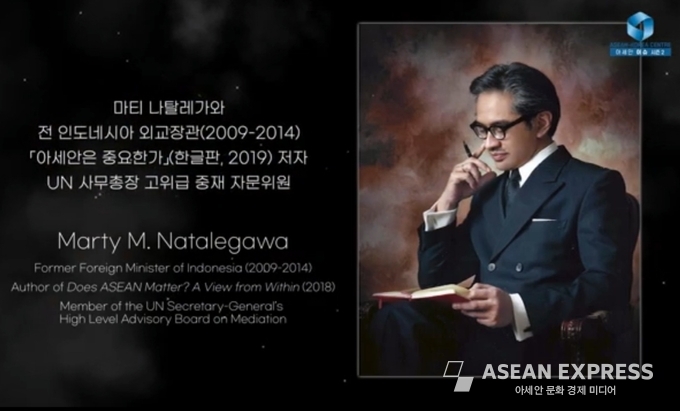
[ASEAN Issue – Ep. 2 Interview with H.E. Marty Natalegawa]
Jennifer: Good afternoon, AKC viewers! Welcome to the 2nd episode of the ASEAN Issue.
On this episode of ASEAN Issue, we will be talking about the importance and relevance of ASEAN and ASEAN-Korea relations in today’s regional and global context. From Jakarta, we have with us His Excellency, Marty Natalegawa, former foreign minister of Indonesia and author of the book Does ASEAN Matter? A View from Within.
Excellency, it is a great pleasure to have you with us today. Would you briefly like to say hello to our viewers who are watching ASEAN Issue at the moment?
Marty: Absolutely, I’m delighted and pleased to have this opportunity to converse with our viewers of the ASEAN Issue and looking forward to our conversation.
J: Thank you once again for joining us despite your very busy schedule.
J: This coming August 8th marks the 54th Anniversary of the establishment of ASEAN, and last year was the 5th anniversary of the launch of the ASEAN Community.
You mentioned in your book how before 1967 the region was marked by deep tensions Many countries in the region were still under the shadow of colonial occupation and the then superpower rivalry between the US and the Soviet Union.
And yet, the five founding members of ASEAN namely Indonesia, Malaysia, the Philippines, Singapore and Thailand were able to take that historic step to transform the “trust deficit” that was prevailing in the region into “strategic trust.”
So could you briefly explain what made such a monumental decision possible at the time, and how the establishment of ASEAN has contributed to the peace and prosperity of Southeast Asia since then?
M: I think, first and foremost, it is important to recognize such a transformation did not take place overnight. It wasn’t something that can simply be promulgated
by the adoption of a declaration or by an agreement. But, it requires a change of mindset, a change of perspectives and paradigms. And this is a process and there have been ups and downs.
It’s not like a one steady progress. But I think most of all, the leaders then, and since, of Southeast Asian countries understood that within our region, issues, such as prosperity and security, are common in nature. They cannot be enjoyed by some at the expense of others. And once we recognize that the security of one country in our region must be enjoyed collectively as a community, so to speak then it becomes clearer what the steps that need to be taken
Even among Southeast Asian countries, there are in-built problems and challenges we have. For instance, many territorial or boundary issues amongst us, and we have also historical problems that burden our relationship, and then our alignments with major powers are not necessarily identical and uniform.
There are so many reasons why we could have remained separated, but then
with the necessary political will and transformative mindset, step by step, we’ve changed things.
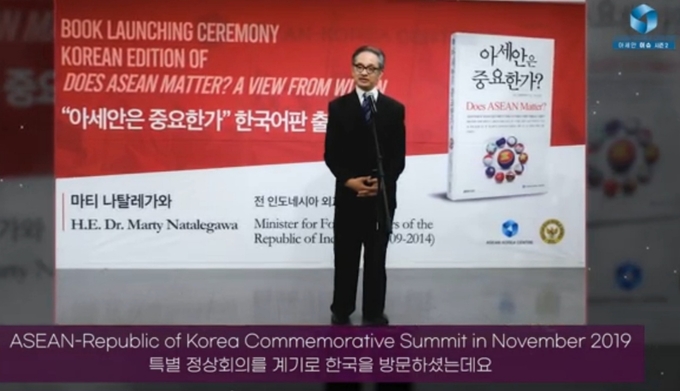
J: Over the years, ASEAN has emphasized this idea of “centrality” where, rather than being in the back seat, ASEAN should be in the driver’s seat when it comes to dealing with regional issues.
The multitude of ASEAN-led mechanisms, including ASEAN+1, ASEAN+3, the East Asia Summit, and the ASEAN Regional Forum all have strengthened ASEAN’s centrality in regional affairs.
But, in your book, you underscore that this “centrality” should not be taken for granted, and that ASEAN today should actively “earn” its centrality and leadership in the regional architecture, particularly given the shifts in regional dynamics and rising uncertainties.
So, my question is, what would you say is the most critical challenge in maintaining ASEAN Centrality? And how can ASEAN Member States collectively cope with these challenges?
M: Southeast Asia, much like Northeast Asia, is a region that has been historically dissected by major power interests and rivalries during the Cold War. Even today,
there are new dynamics.
It’s not only US-China tensions for instance, but there are also other dynamics: India, China and other countries as well. So, for countries of Southeast Asia,
navigating and managing great major power relationships it has been a perennial challenge.
It is a constant reality that we need to navigate and position ourselves in this very complex back-and-forth between the so-called major powers. And, over the years, ASEAN’s mantra of centrality putting itself in the driver’s seat in the region’s development has become recognized.
And to your question, I guess, one of the main challenges for ASEAN is to be able to provide relevance to the current challenges of our region and to have the comfort level, and the trust of our partners.
The reason why countries such as the United States, China, Korea and Japan, etc. are able to come together under the ASEAN home or ASEAN project is because they have confidence in ASEAN’s objectivity and its ability look after the common good, so to speak. And this is easier said than done at the moment.
There are a lot of competing dynamics in our region, between the US and China, between the United States and Russia, between India and China. We have the QUAD now coming up as a process where countries like Japan, Australia, and India are being involved.
Geopolitics is constantly changing. Change is permanent and therefore ASEAN must continue to have the ability to adapt if it’s to remain relevant.
J: Speaking of challenges, today ASEAN is confronted with multiple challenges
COVID-19 to the South China Sea to rising economic inequalities, as well as challenges of climate change.
Of these challenges, one of the most urgent crisis can be said to be the escalating violence in Myanmar. In your view, what more can ASEAN do to peacefully resolve the crisis in Myanmar?
M: ASEAN, if it is to remain central, must not only navigate geopolitical tensions such as the South China Sea etc but also must be relevant to these 21st century problems that are challenges not only to state security but human security.
When you think about the pandemic, what's at stake is not only the collective security of the state, but the security at the individual level: How we can remain healthy amidst all this. And ASEAN, with partners like Korea, must help provide answers.
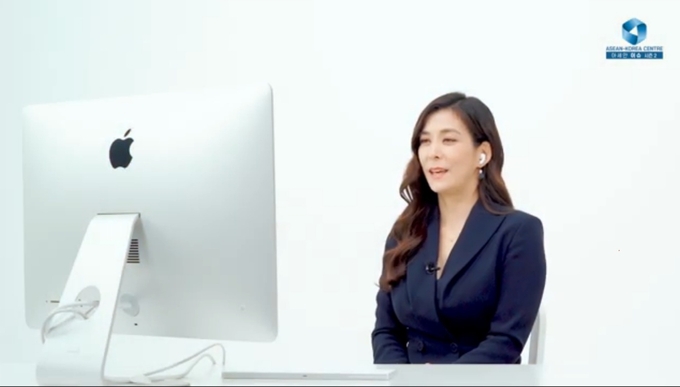
To your question on Myanmar, certainly, this is a litmus test for ASEAN. But, to be honest, ASEAN has been engaged in the past on Myanmar. It is not something that ASEAN must try to reinvent the wheel and enter from scratch, because we've had a decade-long engagement on Myanmar, pushing, prodding, encouraging Myanmar for democratic reform.
Countries like Korea and Indonesia which have gone through democratic transformation from authoritarian rule to more democratic settings recognize this is a process. It requires constant nurturing, constant encouragement, and resilience even.
And I think what we are seeing now in Myanmar is a key test for the country because it's now undergoing a very difficult challenge. But ASEAN must present itself as part of the solution.
Thankfully, after initial hesitation over the past few months whether this is an issue that ASEAN cannot be engaged because of the non-interference principle, that argument is now sort of behind us. ASEAN has met at the summit level, and has issued the so-called Five Point Consensus on Myanmar.
So I think at least that issue of whether ASEAN should engage or not engage is already addressed. But now the real hard work begins; how it can help contribute. This is a very challenging task because almost immediately the Junta in Myanmar, the Tatmadaw leadership, immediately gave their own interpretation to the five-point principles. That poses a challenge for ASEAN.
In my view, ASEAN must persevere and must constantly pursue the follow-up to the five-point principles. These are mainly, cessation of violence, the promotion of dialogue and appointment of a special envoy and then humanitarian assistance and other steps of this type.
There is a great deal of frustration, especially in Myanmar itself among the young people, about how ASEAN performs, and this is really not only a litmus test, it is really a wake-up call for the current generation of ASEAN leadership to do even better on Myanmar.
J: Now, moving on to ASEAN-Korea relations. Does ASEAN matter to Korea, and likewise does Korea matter to ASEAN.
M: When I think about ASEAN-Korea relations, even if I try, I couldn't find anything negative to say about it. Except the challenge of further enhancing, further meeting unfulfilled potentials. But if one was to look at the numbers and the figures, one can quickly recognize how important it is in the economic domain.
The importance of ASEAN as a collective economic entity is only going to grow even more in the decades ahead. Some analysts said that by 2050, we will be the fourth- or the fifth-biggest economy in the world. And therefore, I think as Korea has demonstrated, it would be a missed opportunity if Korea and ASEAN don’t engage closely in this common journey toward common prosperity.
But I must say it is not a one-sided relationship. It is not only, as I suggested just now, that Korea would benefit from engaging with ASEAN but ASEAN itself is benefiting tremendously from Korea's economic growth and potential. If you look at the individual ASEAN member states, all of us have felt the benefit of Korea's economic engagement.
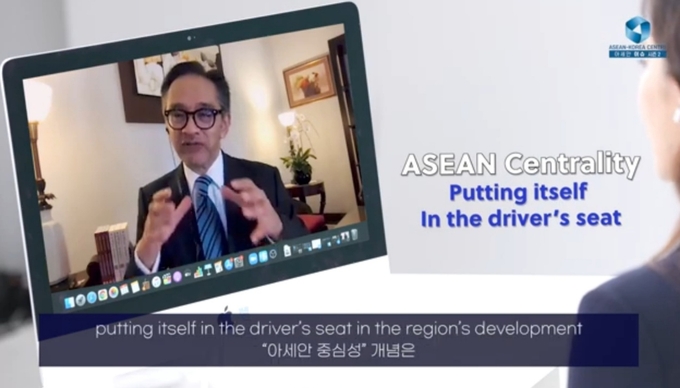
I remember when the economic crisis so-called Asian economic crisis in 1998 occurred, many of our economies imploded including Indonesia. So many foreign businesses and expatriates left Indonesia. And basically the only foreign community that remained in Indonesia, and not only remained, but actually deepened its ties, was actually the Korean business enterprises and community.
And we never forget that. In our moment of need the Korean Community in Indonesia didn't abandon us. They actually deepened their ties and that to us demonstrates a reliable friend, as well.
J: As a former government official and opinion leader representing the intellectual community in ASEAN, how do you assess the New Southern Policy? From ASEAN’s perspective, what are some of the major achievements and shortcomings?
President Moon Jae-in of Korea, during his visit to ASEAN countries in November 2017, unveiled the New Southern Policy to dramatically upgrade ties with ASEAN and envision a ‘People-Centered Community of Peace and Prosperity’ between ASEAN and Korea.
M: First and foremost, its importance is in signaling to ASEAN collectively the importance that South Korea attaches to ASEAN as a region and as a collective entity.
That to us, politically, more than any other manifestation, is extremely important. Here is a country with whom we have a very important relationship with, officially and publicly adopted an outlook policy that recognizes the importance of our region. The importance cannot be over emphasized.
But, as a result of the New Southern Policy initiatives, we can see the ASEAN-Korea relationship has really deepened and widened. We have seen the areas of cooperation becoming not only more multifaceted, but also deeper, especially in the domain of technology, for instance, and people-to-people relations.
And especially the establishment of the ASEAN-Korea Centre is tremendously important in facilitating a greater awareness of ASEAN in Korea. So, I don't find any obvious shortcomings or challenges in terms of the evolution and the implementation of this policy. But more a hope that this kind of policy outlook is continued and built upon.
Because it is a process. It requires, over the years, constant nurturing and investment of efforts. It would be a shame if the momentum already built over the recent years is somehow allowed to dissipate. So, I hope both in Korea and in ASEAN, there is continued commitment to this kind of further enmeshment of the relationship.
J: Now the rising US-China rivalry and growing uncertainties in the global economy are putting pressure on the strategic decisions of many small and medium-sized countries in the region, including the ASEAN Member States and Korea.
In your view, what are some ways that ASEAN and Korea can work together to strengthen resilience against external shocks and maintain peace and stability in the region?
M: I think one of the key features of the current US-China dynamic, unlike the US-Soviet Union Cold War relationship, is that this time around the competition and the dynamics are more multifaceted.
It is not only in the political security and traditional security domain, but it is wider, on the economic relationship, trade, finance, and technology.
And therefore, when we think about how countries like Korea and ASEAN should navigate and manage this reality, it is not only in the political security domain. It is day-to-day developments. For instance, the idea of economic decoupling between the United States and China creates a new schism, a new division in technology, trade and finance.
And countries like Korea and ASEAN may find themselves having to almost choose between one side or the other, or at the very least, they need to manage risks of suffering from collateral damage.
So, I guess, one remedy would be to develop our economic resilience from this kind of shock, so that we don't put all our eggs in one basket. So, diversifying our economic relationship, so we don't really only deepen our ties with the United States and China, but we deepen our economic ties with one another so that if there are some difficulties in US-China ties, we remain resilient, we remain strong in that kind of situation.
So I think efforts at promoting resilience from geopolitical shocks. Resilience meaning, economic resilience. But in the political domain, of course, Korea is especially unique because Korea's strategic alliance relationship with United States is real, is vital, is important to preserve the peace in Northeast Asia and on the peninsula and that has proven its importance.
But at the same time, Korea’s economic engagement with China is becoming more and more important. And that is why ASEAN countries need to find, I use the term equilibrium, rather than balance. But to find equilibrium, how to navigate and how to maintain this very difficult relationship. But it's easier said than done. It requires a lot of perseverance, a lot of adaptability to new situations.
J: You visited Korea on the occasion of the ASEAN-Republic of Korea Commemorative Summit in November 2019. If travel resumes, what do you hope to do in Korea?
M: Whenever I travel to Korea, the one that I enjoy most obviously, aside from the sights and delicious food is the company, the people: the friends that I'm able to re-establish contact with and renew ties with, and new friends to make. And, of course, we would like to have our Korean friends and Korean viewers come to Indonesia as well.
J: Thank you very much. I'd like to thank you very much again for your time. It was a great pleasure to have you on ASEAN issue and thank you so much.
M: Thank you very much indeed for having me.









